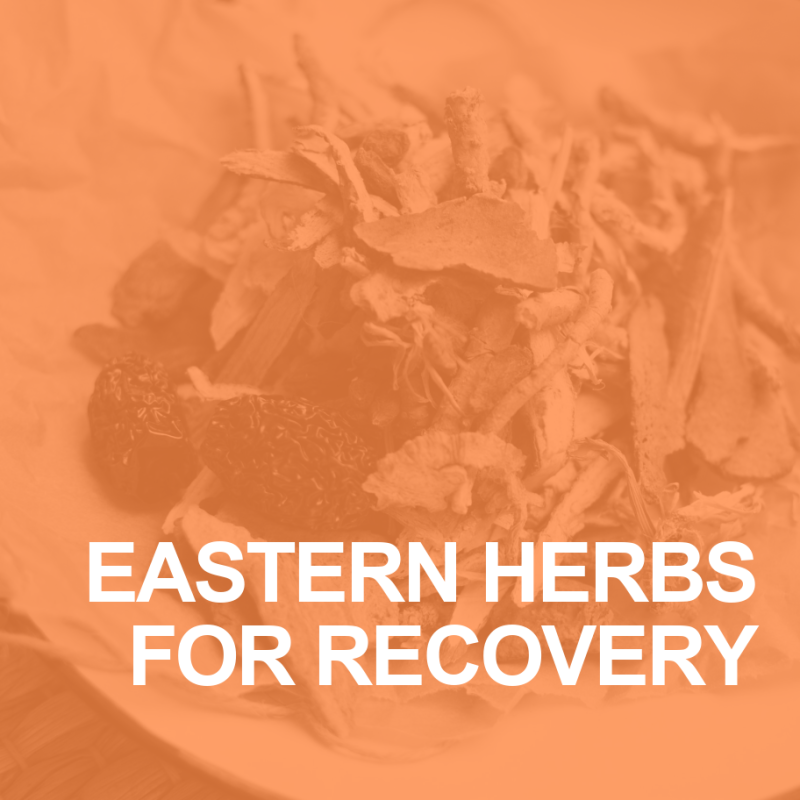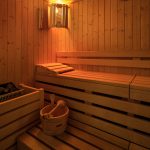
How might supplementing with herbs for recovery help our personal training clients?
Post-exercise recovery can be sorely underrated (no pun intended). We as personal trainers need to honor its importance and convey the gravity of recovery to our clients as well as provide them with tips and tools to do so. After having suffered from some injuries myself and working with clients post-injury I’ve come to value and commit to the recovery process.
One of the things I have discovered in my training is that there is a panacea of herbs, both Traditional Eastern herbs and modernized Western herbs, that can aid in the recovery process.
Common Modalities for Recovery
There are physiological benefits of recovery and there are different recovery types: active recovery and passive recovery.
A few things that a personal trainer can have their athlete do for recovery include getting a massage, taking an Epsom salt bath, or taking a rest day. Nutrition’s role in recovery is important, as is adjusting one’s mindset to effectively recover.
Eastern Herbs for Recovery
Most people will probably not look to herbs first as an avenue to recovery. For those who are unfamiliar, this article will focus on the role of Eastern herbs on exercise recovery.
Definition of “Herbs”: Any plant with leaves, seeds, or flowers used for flavoring, food, medicine, or perfume.
Herbology: The use or study of herbal medicine.
Brief History of Eastern Herbology
Eastern Herbology’s use for medicine dates back to at least 1000 years ago. Some say it started in pre-historic times, but its first written record comes from a 2nd-century AD classic titled Shen Nong Ben Cao Jing (Divine Husbandman’s Classic of the Materia Medica) from the 618-907 A.D. time period.
Its long-standing history works both in its favor and simultaneously to its detriment. Because it’s been around for so long, herbs used for recovery have held strong over time and are still used to this day. However, since they have been around for so long, there has been some resistance and challenges for herbalists and the field to do evidence-based research on its efficacy given that its use pre-dated the scientific method.
Fortunately, the industry is becoming open to the scientific method and research has been conducted on the efficacy of Chinese herbs on exercise recovery. Simply put: the science is catching up with its use. The scientific method is attributed to being founded and started in Europe in the 1600s, long after herbalism was known to start. However, scientific rigor can certainly be applied in the present day.
The use of Eastern herbs and recovery could be applied to such conditions as:
- Arthritis
- Arthralgia (joint stiffness)
- Sciatica
- Pain (muscle and joint)
- Spasms
- Aches
- Weakness
- Numbness
- Atrophy
Other uses for Eastern herbs that can get athletes back into activity:
- Bones spurs
- Post-stroke complications
Three Eastern Herbs for Recovery:
- Du Huo – Radix Angelicae pubescentis: This herb is beneficial to relieve pain (joint and back health).
- Lu Rong (tip of deer antler, fuzzy part) – cornu cervi (plant-derived): Rebuilds and nourish joints, helps to enhances strength and endurance, relieve joint and muscle discomfort, shorter recovery time from exercise and injury, optimize function of joints, increase energy.
- Dong Chong Xia Cao cordyceps (winter bug, summer herb) It is derived from a fungus harvested from the head of a caterpillar. Relaxes and dilates bronchial muscles, improves oxygen delivery throughout the human body, enhances energy levels, improves adrenal gland strength, provides support for the immune system, promotes healthy circulation, helps to normalize blood sugar and fats, and assists in maintaining blood pressure in a normal range.
- Ginseng & Danshen Radix Salviae Miltiorrhizae (Red Sage Root, Salvia Root) According to the National Health Research Institute (2016), the combination of panax ginseng and danshen, taken seven days in a row prior to downhill running significantly healed male runners’ muscle damage and arterial stiffness. This significantly increased their range of motion compared to the control group.
One contrary view to the use of Eastern herbs for exercise recovery is that many are not overseen by the Food and Drug Administration (FDA). For example, the three listed above have not been evaluated by the FDA. The products are not intended to diagnose, treat, cure, or prevent any disease. It’s highly recommended to consult with a physician and/or Traditional Chinese Medicine practitioner before using any products or if you have any questions/concerns about your health. Also, the following are important considerations before taking Eastern herbs for exercise recovery:
Have they been:
- Tested for quality
- Tested for consistency
Many Eastern herbal companies are now publishing White Sheets and their process for quality control on their website or in scholarly journals and databases such as the Evidence-Based Complementary and Alternative Medicine and Journal of Integrative and Complementary Medicine. Also, certain companies such as Evergreen Herbs and Golden Flower Herbs will only sell herbal products to credentialed providers and practitioners and have internal processes for quality control. It is also important to purchase the herbs from a reputable source.
What are the:
- Potential Contraindications
- Potential Drug Interactions
If you are taking Western medications and are under a provider’s care, it is important to let them know about your Eastern herbs.
Like anything new that you introduce to your body, pay close attention to how it reacts to the herbs. Sometimes, the herbs take time to build up in your system in order to see or experience the results.
Western Herbs for Recovery
Although the use of Western herbs for health, vitality, and recovery may not boast the lengthy history that Eastern Herbs do, there are still several that have been closely examined for their benefits and are worth discussing here. Let’s talk about how Western Herbs can assist in athletic recovery.
Western Herbs Found and Defined
Western Herbs leverage the use of adaptogens when it comes to exercise and recovery. As one might gather, adaptogens help the body adapt to stressful conditions. These stressful conditions could be a number of life circumstances, but in the case of athletes, it refers to whatever exercise, training, or competition they’ve just participated in. Taking apoptogenic herbs helps the recovery process afterward.
Western Herbs were found in the 1940’s by Russian scientists but it’s important to note that the herbs covered in this article are also used by other cultures and traditions, and are merely presented from a lense of Western cultures. In Traditional Chinese Medicine, these same herbs are referred to as, “chi tonics,” (or qi tonics) and in Ayurvedic practice, they’re known as Rasayana. Prior to being called adaptogens, Traditional Western Herbalists called these herbs trophrestoratives or modulators.
Most Helpful Western Herbs
Although the number of herbal preparations on the market is too numerous to list, there is a handful of herbs that tops the charts in proving their worth in athletic practice, providing support during competition and intense training periods. These helpful herbs include:
Tulsi (Ocimum sanctum): This is also known as holy basil. It can be referred to as the “The Great Protector” in Ayurvedic traditions and cultures because it helps calm the nervous system without impeding the digestive and immune systems. It can both calm and energize the body post-workout and/or exercise. It does this by reducing the human body’s stress response, like cortisol production and insulin sensitivity, allowing the body to continue to focus on “rest and digest” work.
Rhodiola (Rhodiola rosea): This is also known as roseroot. It’s a Siberian herb that helps improve mental clarity, focus, and increase overall energy. This is because Rhodiola plays a supportive role in the human body making adenosine triphosphate (ATP), the primary energy source for all cells. One caveat is that if your body is sensitive, be mindful that Rhodiola can be stimulating. Starting with smaller doses and working up is advised. Alternatively, you can seek medical advice from a credentialed professional if you have concerns.
Ashwagandha (Withania somnifera): This herb has been shown to support healthy libido and immune system. It helps to balance the adrenal-endocrine system. If you tend to have sleep disturbances the night after rigorous movement, this herb is known to promote healthy sleep. As a result, if you wake up feeling rested, the human body can function more optimally during the day to help it to continue recovery efforts the next day.
Oxidative Stress and Western Herbs
Nutrition plays a key role in recovering from oxidative stress; while it’s imperative to make sure your athlete’s post-exercise nutrition is on point, the following herbs can also assist:
Lychii (Lycium barbarum or L. chineses): This is also known as goji berry or wolfberry. Lychii helps the human body replenish its blood supply. This helps support a healthy circulatory system, allowing the body to remove free radicals. Athletes can eat these as a stand-alone snack or add them to smoothies or cereal.
Cinnamon (Cinnamomum cassia or C. ceylon) is very effective to help the human body track down excessive free radicals and get rid of them. This is because cinnamon contains free radical-scavenging properties and constituents. Cinnamon is referred to as being ‘hot’ or having ‘hot properties.’ This means that it’s very stimulating and can get an athlete’s energy moving.
Sometimes athletes pair cinnamon with the more subtle working rose hips and/or hibiscus. It can be taken daily as maintenance so there’s a steady supply available in the body or it can be taken as needed post-exercise. You can drink it as a tea or make a tea/warm beverage by boiling a cinnamon stick and drinking the liquid.
Rose hips (Rosa spp.) and hibiscus (Hibiscus rosa-sinensis or H. sabdariffa) are high in vitamin C, making them a potent set of antioxidant herbs. Both support healthy circulation and reduce inflammation. They can be mildly diuretic, so be mindful to take these in moderation. Rose hips tend to be less diuretic and mildly warming. Since Rose hips can be warming, athletes in colder climates and athletes in warmer climates might want to take hibiscus. If your athlete lives in alternating climates, rose hips can help during colder months and hibiscus can help in warmer months. These can be added to tea or bought and drank as teas.
Caveats
It is important to note that anyone with underlying or pre-existing medical conditions should discuss the use of herbs for post-exercise recovery or as part of a daily preventive routine with a credentialed medical provider. Using herbs is not without its opposing viewpoints. While these herbs often can be eaten as snacks, as part of meals, or teas, they can still alter the human body’s physiology. As such, if you’re taking other adaptogens or supplements that do the same thing, please proceed with caution. Adding additional adaptogens can create a synergistic effect and actually be detrimental to recovery.
Some of these herbs are now available in more potent capsule tablet forms. It’s important to do a little research before purchasing and taking these products to make sure they come from reliable, quality-assured sources.
Also, sometimes the human body can respond differently to an herb than in most cases. This is no different than if you are taking a supplement and find that you are allergic to an ingredient in it or the casing, or simply that your body is not responding to it whereas most people do. In this case, be prudent about the decision to continue on it or not.
I’d encourage you to be open-minded and enjoy the process of trying some the herbs mentioned for post-exercise recovery, and discuss them with your clients. As always the body is the best teacher, and how it responds is the most valuable lesson.
References:
Li, C., Huang, J., Cheng, Y.C., Z., & Y.W., (2020). Traditional Chinese Medicine in depression treatment: From molecules to systems. Frontiers in Pharmacology, 11(586), 1-11. https://doi.org/10.3389/fphar.2020.00586
https://www.frontiersin.org/articles/10.3389/fphar.2020.00586/full
activeherb.com/blog/chinese-herbs-in-support-of-speedy-workout-recovery.html
https://d267putgahf11p.cloudfront.net/files/file_166.pdf
https://www.modernherbshop.com/Du_Huo_Ji_Sheng_Pian_JointsJoy_p/jointsjoy.htm
https://plumdragonherbs.com/blogs/news/cordyceps-dong-chong-xia-cao-for-sports-performance-the-latest-research
https://w.evherbs.com/herbal-products
https://gfcherbs.com/
naturalhealthresearch.org/chinese-herbal-combination-improves-muscle-recovery-exercise-men/
activeherb.com/blog/chinese-herbs-in-support-of-speedy-workout-recovery.html
learningherbs.com/remedies-recipes/herbs-for-athletes/
https://www.healthline.com/health/food-nutrition/basil-benefits
https://www.healthline.com/nutrition/rhodiola-rosea#TOC_TITLE_HDR_2
https://www.ncbi.nlm.nih.gov/pmc/articles/PMC3252722/
https://www.webmd.com/diet/goji-berries-health-benefits-and-side-effects
https://www.nccih.nih.gov/health/cinnamon
https://www.ncbi.nlm.nih.gov/pmc/articles/PMC5485961/







